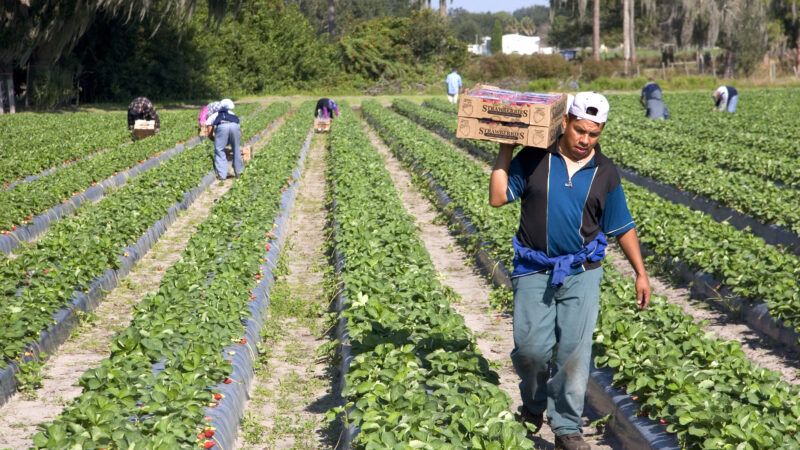Trump's Labor Department Admits That Trump's Immigration Crackdown Is Causing a Shortage of Farm Workers
With fewer immigrant workers available on American farms, there is a risk of "supply shock-induced food shortages," the Labor Department says.

The Trump administration's immigration crackdown is making it harder for American farms to find seasonal workers and putting the nation's food supply chain at risk.
But don't take my word for it. Ask the Trump administration itself.
In documents filed to the Federal Register earlier this month, the Department of Labor warned of a "current and imminent labor shortage" on American farms that "presents a sufficient risk of supply shock-induced food shortages." The shortage is being caused by the administration's crackdown on undocumented workers, "who previously cycled in and out of the U.S. through a porous border," but are now being kept out or choosing not to try to enter the country in the first place.
The loss of those temporary, undocumented workers could have a big impact on American farms. The Labor Department cites a study that found a 10 percent decline in the agricultural workforce would result in a 4.2 percent reduction in farm output and a 5.5 percent decline in farm revenue. "Given that approximately 42 percent of the U.S. crop workforce are unable to enter the country, potentially subject to removal or voluntarily leaving the labor force, these impacts will likely be dramatically higher," the department notes. "Such significant economic impacts not only create tangible and imminent economic harms, but they structurally disrupt the ordinary operations of the U.S. agricultural sector, resulting in shortages of agricultural commodities that cannot be supplemented with imports in the near-term."
The Federal Register documents are a refreshingly straightforward admission of a tradeoff that the Trump administration has been less willing to discuss in more public settings. In July, for example, Agriculture Secretary Brooke Rollins said mass deportations would "move the workforce towards automation and 100 percent American participation." She also suggested that able-bodied adults currently receiving Medicaid benefits should look for agricultural jobs vacated by undocumented workers.
That doesn't seem to be happening. America's agricultural workforce has declined by about 80,000 between January and August, according to Bureau of Labor Statistics data.
The consequences are starting to be felt. "People don't understand that if we don't get more labor, our cows don't get milked and our crops don't get picked," Tim Wood, a Pennsylvania dairy farmer, told Politico last month.
The immigration crackdown is also making it harder for legal immigrants using the H-2A visa, which allows foreigners to enter the country for one year to work agricultural jobs. Lee Wroten, a Florida farmer, told a local Fox affiliate this week that fewer legal immigrants are turning up for work, in part because they are "freaked" out by ICE raids that have indiscriminately targeted legal and undocumented immigrants alike.
As for Americans taking those jobs? Wroten says that's not happening. "It's hard work—it's hot, sweaty, not sexy, and most Americans don't want to do that kind of work."
The Department of Labor filings in the Federal Register come to the same conclusion.
"The Department does not believe American workers currently unemployed or marginally employed will make themselves readily available in sufficient numbers to replace large numbers of aliens no longer entering the country, voluntarily leaving, or choosing to exit the labor force due to the self-perceived potential for their removal based on their illegal entry and status," the report states. "The available data strongly demonstrates a persistent and systemic lack of sufficient numbers of qualified, eligible, and interested American workers to perform the kinds of work that agricultural employers demand."
Improving the H-2A visa program could help solve the labor crisis that's developing in American agriculture—because making it easier for workers to enter the country legally is the best way to reduce illegal immigration. Unfortunately, as Kelly Lester explained in Reason earlier this year, the current H-2A visa program "is riddled with costs, bureaucracy, and inefficiency." As a result, "American farmers are being crushed not only by worker shortages but by a broken guest worker system that cannot meet their needs."
It would have made sense for the Trump administration to implement a better guest worker program before trying to slam the border shut. Instead, it will now have to face the consequences of its own actions—and Americans will pay the price when food supply chains get snarled.


Show Comments (78)